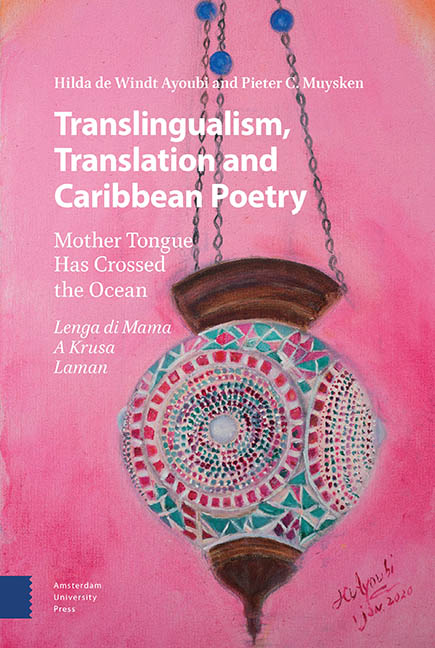Book contents
- Frontmatter
- Dedication
- Contents
- How to Navigate This Book: Kon Nabegá den e Buki akí
- Acknowledgements
- Preface
- Part 1 Introducing the Mother Tongue: Introdukshon di Lenga di Mama
- Part 2 The Poem “Lenga di Mama” and its Translations, Comments and Language Descriptions E Poema “Lenga di Mama” i su Tradukshonnan i Komentario i Deskripshon di e Idiomanan
- Part 3 The Poem “E ‘papiá’ di Papiamentu” and its Translations E Poema “E ‘papiá’ di Papiamentu” i su Tradukshonnan
- Part 4 The Poem “Papiamentu pa Semper” and its Translations E Poema “Papiamentu pa Semper” i su Tradukshonnan: The Translations and Editing of the Poem Hilda de Windt Ayoubi and Pieter Muysken (for Dutch)
- Part 5 The Poem “Riba Ala di Lenga di Mama” and its Translations E Poema “Riba Ala di Lenga di Mama” i su Tradukshonnan
- Part 6 Commentary: Komentario
- Note on the Authors: Informashon tokante e Outornan
- Index: Índise
Other Indo-European Languages: Otro IdiomananIndo-Europeo
Published online by Cambridge University Press: 15 September 2022
- Frontmatter
- Dedication
- Contents
- How to Navigate This Book: Kon Nabegá den e Buki akí
- Acknowledgements
- Preface
- Part 1 Introducing the Mother Tongue: Introdukshon di Lenga di Mama
- Part 2 The Poem “Lenga di Mama” and its Translations, Comments and Language Descriptions E Poema “Lenga di Mama” i su Tradukshonnan i Komentario i Deskripshon di e Idiomanan
- Part 3 The Poem “E ‘papiá’ di Papiamentu” and its Translations E Poema “E ‘papiá’ di Papiamentu” i su Tradukshonnan
- Part 4 The Poem “Papiamentu pa Semper” and its Translations E Poema “Papiamentu pa Semper” i su Tradukshonnan: The Translations and Editing of the Poem Hilda de Windt Ayoubi and Pieter Muysken (for Dutch)
- Part 5 The Poem “Riba Ala di Lenga di Mama” and its Translations E Poema “Riba Ala di Lenga di Mama” i su Tradukshonnan
- Part 6 Commentary: Komentario
- Note on the Authors: Informashon tokante e Outornan
- Index: Índise
Summary
Abstract
Earlier, we have presented two branches of theIndo-European language family, the Romancelanguages and the Germanic languages, but thelanguage family is much larger, with speakers ofdifferent branches living from Iceland to India.The family is often claimed to have beenestablished by the English scholar and colonialjudge in India, Sir William Jones in 1786, butother European travelers and scholars had pointedto the existence of similarities between thelanguages of northern India and the Mediterranean(Italian, Greek, Latin) since the sixteenthcentury. We cannot present translations into asmany languages as there are in the family, buthave to limit ourselves to some here, presentedroughly from west to east.
Keywords: Old Languages, LiteraryTradition, Reading, Films
Irish (Gaeilge) is spoken both in Irelandand Scotland. in two different varieties, Irish(Gaelic) and Scottish Gaelic. Like Welsh, it is oneof the Celtic languages and thus part of the IndoEuropean languages. Although Irish has the thirdoldest literature in Europe after Latin and Greek,it has now been reduced to the language of aminority on the island of Ireland, spoken daily byabout 150,000 people, most of whom speak English aswell. It is spoken as a first language in countiessuch as Cork, Donegal, Galway and Kerry, as well asin smaller areas of the counties of Mayo and Meathand Waterford. Even though it is an officiallanguage of the country, it is in an endangeredstate, and as such it should be conserved.
Greek is the official language of Greeceand Cyprus. It has 13 million speakers in Greece,Cyprus, southern Albania, as well as in diasporacommunities all over the world and small traditionalpockets of speakers elsewhere in the easternMediterranean. In addition to the modern standardlanguage, there are many dialects. The language iswritten with the traditional alphabet inherited fromAncient Greek, from which it descends but from whichit also significantly differs. The impact of Greekupon the vocabulary of all languages, includingEnglish, has been enormous. Many prefixes such as,-poli (many), ‒tele (distance) andsuffixes such as -gram(letter), phobia, areused in the majority of languages. Modern Greekliterature started flourishing around 1600, andsince the nineteenth century there has been a steadystream of novels and poetry collections written inGreek.
- Type
- Chapter
- Information
- Translingualism, Translation and Caribbean PoetryMother Tongue Has Crossed the Ocean, pp. 191 - 216Publisher: Amsterdam University PressPrint publication year: 2022

